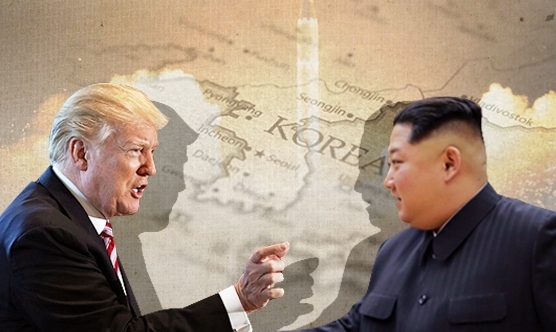Posted on : Apr.13,2018 17:20 KST
Modified on : Apr.13,2018 17:33 KST
 |
|
US President Donald Trump and North Korean leader Kim Jong-un
|
With the inter-Korean summit just two weeks away, a strategy for ending the Cold War regime on the Korean Peninsula has become a matter of interest. The key question is how to achieve the denuclearization of the Korean Peninsula. It’s fair to say that the success of the summit will be determined by whether a compromise can be reached on this issue that will be satisfactory to both sides. North Korea is emphasizing a “gradual and simultaneous” solution, while the US is focusing on a “grand bargain. Since the South Korean government seeks to serve as a mediator between North Korea and the US, it needs to come up with a creative solution that can narrow the gap between them.
What merits our attention in connection with this is the “Korean solution” to denuclearization. This solution, which Cho Sung-ryul, senior research fellow for the Institute for National Security Strategy, proposed during a forum held on Apr. 12, is a process consisting of a “comprehensive agreement, a grand bargain and gradual implementation.” During the inter-Korean summit, a “comprehensive agreement” would be achieved that would cover North Korea’s denuclearization and a security guarantee for the North Korean regime from South Korea and the US.
Following this, during the North Korea-US summit, a “grand bargain” would be reached specifying the dismantlement of the North’s nuclear program and its corresponding rewards. After that, “gradual implementation” would be pursued through the drafting of a plan for implementing the agreement during working-level talks toward denuclearization, the subsequent execution of that plan, and finally inspection by the International Atomic Energy Agency. This plan can be seen as feasible since it represents a third way that takes into consideration the differences of opinion between North Korea and the US.
The Libyan solution and the Iranian solution have often been mentioned in connection with ways to denuclearize the Korean Peninsula. But there is hardly any chance of reaching a compromise on these solutions. While the US prefers the Libyan solution, in which dismantling of the nuclear program comes first and the rewards come later, North Korea rejects that as a scheme to first disarm the regime and then overthrow it with military force. For its part, the US is opposed to the Iranian solution, in which denuclearization proceeds in stages and sanctions are reduced accordingly. US President Donald Trump is pushing to pull out of the Iran nuclear deal signed by his predecessor, Barack Obama, which he regards as the “worst deal ever.” In that sense, it’s worth taking note of the Korean solution, which combines a “grand bargain” and “gradual implementation.”
The Korean solution is also largely consistent with the plan for denuclearization that the South Korean government has been promoting both directly and indirectly. The position of the Blue House is that North Korea’s denuclearization and a security guarantee for the regime are two sides of the same coin and as such would have to proceed in stages even if a grand bargain is reached. Bearing that point in mind, it can be said that there is a considerable chance of North Korea and the US reaching a compromise. We hope that the South Korean government will manage to persuade North Korea and the US to move in that direction.
Please direct questions or comments to [english@hani.co.kr]






